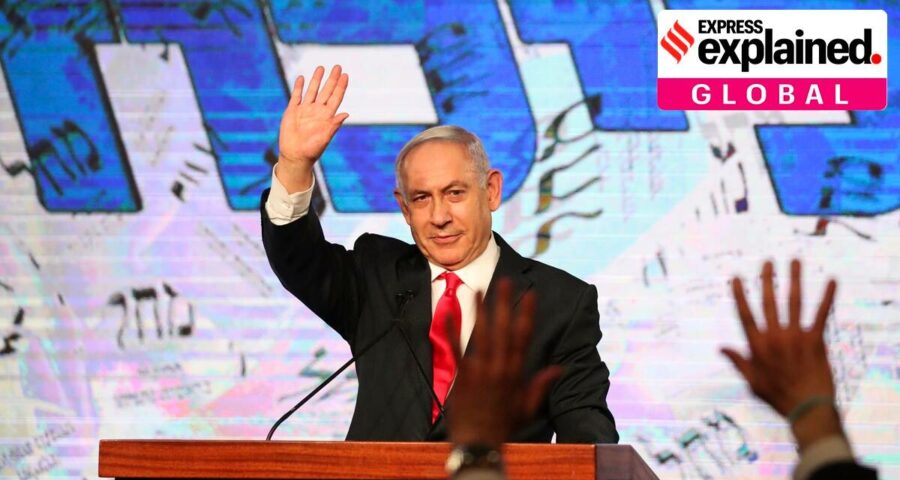Israel’s President Reuven Rivlin’s decision to give Israel’s longest-serving prime minister another term is controversial since Netanyahu has been indicted for crimes on the grounds of fraud, breach of trust and bribery.
Israel’s President Reuven Rivlin Tuesday invited prime minister Benjamin Netanyahu to form a majority government in Israel’s fourth election since April 2019. The elections held on March 2 left no party with the 61 seat majority required to form a government. In the 120-seat house, Netanyahu has 52 supporters while the others are divided amongst different parties.
Rivlin’s decision to give Israel’s longest-serving prime minister another term is controversial since Netanyahu has been indicted for crimes on the grounds of fraud, breach of trust and bribery. His corruption trial began this Monday. In a statement, Rivlin said “the president should not give the role to a candidate that is facing criminal charges” but lawfully he must since Netanyahu has the highest chance of forming a government.
No party has ever won a clear majority in Israeli elections and coalitions are necessary for forming a government. However, due to rising political differences between parties, this is becoming increasingly difficult.
Netanyahu has up to six weeks to form a government. However, it does not look like an easy road this time around and speculations are already rising about a potential fifth election later this year.
Why a fourth election?
Since 2019, neither Netanyahu nor his opponents have been able to secure enough seats in parliament to form a stable government. Over the course of the last two years, Netanyahu has been rendered as a caretaker prime minister or leading a fragile coalition. This political instability has created a political deadlock that forces Israelis to vote time and again in hopes of having a stable government.
Israelis have long been protesting against Netanyahu citing pandemic woes, economic crisis, lack of a state budget and various unfulfilled promises. Many want him to be held accountable for his corruption scandals.
Political analysts say that re-elections is one way through which Netanyahu has remained in power for over 12 years and that he is ready to drag the country through endless elections until he wins a stronger parliamentary majority that could change legislations to prevent him from being prosecuted.
What are the charges against Netanyahu?
Netanyahu has been accused of providing political favours to businessmen in exchange for gifts. He has also allegedly paid newspapers for positive coverage and removal of stories that criticise him.
Since being indicted in May 2019, Netanyahu has maintained his innocence and says the prosecutors, police and media are launching a witch hunt against him in order to overthrow “a strong, right-wing prime minister.”
Political analysts argue that Netanyahu’s best shot at winning his case is to remain Prime Ministers that will allow him to pass a legislation in his favour or even delay or cancel the case. At the very least, he must prevent the opposition from forming a government.
There is no constitutional law that prevents a prime minister to stand down unless convicted, thus there are no political or legal reasons why Netanyahu would step down.
What’s next?
The latest election too has not resulted in a much different outcome than the previous three. Many of Netanyahu’s rivals campaigned under the ‘pro-change’ and ‘anyone but Netanyahu’ blocs, however, these attempts haven’t translated into seats. Even if they won a majority, a coalition would not necessarily lead to a stable government as their shared loathing for Netanyahu is not enough to bridge the differences between their parties.
Netanyahu is most likely to seek support of a small bloc of conservative parties to form a right-wing government. But many of these extreme right-wing parties have agenda that could further divide Israelis and undermine democracy.
A small conservative Islamic party that has gained considerable seats believes that the best way to achieve successful integration of Arabs in Israel is by holding political influence by being in the government. The party leaders have said they are willing to join either Netanyahu or the opposition in order to be in office. This is dramatically opposite to Netanyahu’s support for his conservative counterparts.
Netanyahu neither has the majority or public support, but he doesn’t require them to continue to rule. He is likely to persuade his opponents and former aides to support him by offering them powerful government ministries or legislative committees.
Over the next six weeks, there is expected to be extensive coalition negotiations with small parties gaining significant political influence.
Nandni Mahajan is an intern with indianexpress.com
Source: Read Full Article



